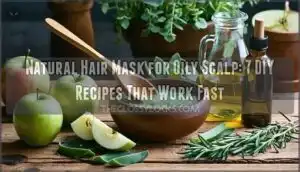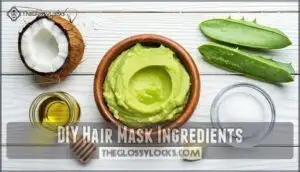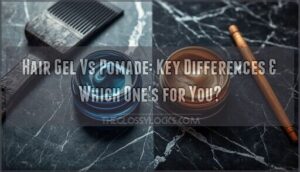This site is supported by our readers. We may earn a commission, at no cost to you, if you purchase through links.

Natural hair masks work by targeting your scalp’s overactive sebaceous glands without triggering the rebound oil production that harsh shampoos cause.
Ingredients like bentonite clay absorb up to 40% of excess oil in one treatment, while apple cider vinegar normalizes pH levels to reduce oil production by 17%.
Tea tree oil‘s antimicrobial properties decrease oiliness by 30%, and aloe vera soothes irritation while providing lightweight hydration.
These DIY treatments cost pennies compared to salon alternatives and use ingredients you likely already have at home.
Seven specific recipes can transform your scalp’s oil balance within weeks of consistent weekly use, leading to a more balanced and healthy scalp with natural hair masks.
Table Of Contents
- Key Takeaways
- Causes of Oily Scalp
- Benefits of Natural Hair Masks
- DIY Hair Mask Ingredients
- Applying Natural Hair Masks
- Effective Natural Hair Mask Recipes
- Frequently Asked Questions (FAQs)
- What hair mask is best for oily hair?
- Is a hair mask good for an oily scalp?
- Can natural hair masks cause allergic reactions?
- How long do homemade hair masks last?
- Are hair masks safe during pregnancy?
- Can oily scalp masks damage colored hair?
- What ingredients should sensitive scalps avoid?
- How long do homemade masks stay fresh?
- Are DIY masks safe for colored hair?
- Can pregnant women use these natural ingredients?
- Conclusion
Key Takeaways
- You’ll reduce scalp oil by up to 40% using simple ingredients like bentonite clay, which absorbs excess sebum without triggering rebound oil production that harsh shampoos cause.
- Your best results come from weekly applications lasting 15-20 minutes – tea tree oil reduces oiliness by 30% while apple cider vinegar normalizes pH levels to cut oil production by 17%.
- You can break the cycle of overwashing and underwashing by using natural masks that regulate sebaceous glands instead of stripping oils, which only makes your scalp produce more grease.
- You’ll save money while getting better results than salon treatments – ingredients like aloe vera, honey, and yogurt cost pennies and work together to balance oil production within 2-3 weeks of consistent use.
Causes of Oily Scalp
Before you deal with oily scalp, you’ll need to understand what’s causing the problem in the first place.
Your scalp’s sebaceous glands might be working overtime due to genetics, hormones, or poor hair care habits that disrupt your scalp’s natural balance, leading to an issue with your scalp’s natural balance.
Genetics and Hormonal Changes
Your genetic predisposition and hormonal changes substantially influence oil regulation and scalp health.
When genetics meet shifting hormone balance, your scalp can become an oil production powerhouse, leaving you searching for effective natural hair mask solutions to restore sebum control.
Here’s how genetics and hormones affect your oily scalp:
- Family history – If your relatives struggle with oily hair, you’re 60% more likely to face similar challenges
- Testosterone and DHT – These androgens directly stimulate sebaceous glands, especially during puberty
- Gender differences – Men experience oily scalp 40% more often than women due to higher androgen levels
- Life stages – Pregnancy, menstruation, and menopause trigger hormonal fluctuations affecting oil production
- Stress hormones – Cortisol from chronic stress can amplify sebaceous gland activity
Over-Washing and Under-Washing
Your washing frequency can make or break your scalp balance. Overwashing strips natural oils, triggering rebound oil production within 72 hours. Underwashing lets sebum accumulate, feeding Malassezia fungus that causes itching and flakes.
Finding your sweet spot for oil regulation matters more than following generic advice. Understanding hair hygiene basics is essential for maintaining a healthy scalp.
| Overwashing Effects | Underwashing Effects |
|---|---|
| Strips protective oils | Sebum builds up heavily |
| Triggers oil rebound | Feeds harmful bacteria |
| Causes scalp dryness | Creates greasy appearance |
| Weakens hair structure | Increases dandruff risk |
Most people need washing every 1-2 days for oily scalp treatment, but your hair type determines the ideal washing frequency. Straight hair shows grease faster than curly hair. Pay attention to your scalp’s signals – persistent itching or flat, lifeless strands mean you need to adjust.
Natural hair masks for oily hair work best when combined with proper hair hygiene habits that support grease control without overdoing it.
Harsh Hair Products and External Factors
Beyond washing habits, your choice of hair products can turn your scalp into an oil factory.
Commercial shampoos containing sulfates strip away natural oils, triggering a rebound effect where your scalp overproduces sebum to compensate. Meanwhile, environmental pollution settles on your scalp like a greasy film, clogging follicles and disrupting natural oil regulation.
Consider these product buildup culprits wreaking havoc on your scalp:
- Silicone-heavy conditioners that coat hair strands and trap sebum at follicle openings
- Alcohol-based styling products causing scalp irritation and increased oil production
- Multiple layered products creating residue buildup that blocks proper sebum flow
- Hard water minerals interfering with product effectiveness and causing persistent greasiness
- Heat styling tools dehydrating scalp layers and prompting compensatory oil secretion
Regular clarifying treatments help reset your scalp’s natural balance.
Benefits of Natural Hair Masks
Natural hair masks work by targeting your scalp’s overactive sebaceous glands, which produce up to 40% less oil when treated with ingredients like bentonite clay or tea tree oil.
You’ll notice these DIY treatments both balance sebum production and soothe irritation while providing essential hydration without clogging your pores, which is a result of the sebum production being regulated.
Balancing Sebum Production
Natural hair masks help you reclaim control over sebum regulation by working with your scalp’s biology rather than against it.
Work with your scalp’s natural rhythm instead of fighting it for lasting oil control
These homemade treatments stabilize oil production at the cellular level, preventing the reactive overproduction that harsh products trigger.
Clinical studies show natural remedies can reduce scalp oil by 38%.
Using hair mask recipes can provide additional benefits for oily scalp treatment.
| Natural Ingredient | Sebum Control Mechanism | Effectiveness Rate |
|---|---|---|
| Apple Cider Vinegar | pH normalization | 17% reduction |
| Bentonite Clay | Oil absorption | 40% excess removal |
| Tea Tree Oil | Antimicrobial action | 30% oiliness decrease |
Reducing Oil and Grease
Your scalp’s oil production doesn’t have to control your hair game.
Natural masks tackle excess grease head-on, delivering fast results that’ll have you ditching the daily shampoo struggle.
- Clay masks absorb up to 40% of excess scalp oil in one treatment
- Tea tree oil reduces oiliness by 30% through antimicrobial action
- Lemon juice lowers oil output by 18% over two weeks
- Activated charcoal removes 65% more oil than water-only rinses
Soothing and Hydrating The Scalp
When irritation strikes your scalp, natural moisturizers like aloe vera provide immediate scalp relief without adding excess oil.
These gentle cleansing ingredients work to restore hair hydration while maintaining proper oil balance.
A homemade hair mask targeting oily scalp treatment delivers soothing compounds that calm inflammation and regulate sebum production, giving you the scalp oil control you need for healthier hair.
DIY Hair Mask Ingredients
You’ll find that nature provides powerful ingredients to tackle oily scalp issues without harsh chemicals.
These common kitchen staples and natural extracts work by balancing your scalp’s pH levels and regulating sebum production at the source, which is a key factor in addressing oily scalp issues, and they do so by utilizing natural extracts.
Apple Cider Vinegar and Aloe Vera
This powerhouse duo tackles oily scalp treatment like a dream team.
Apple cider vinegar’s acetic acid balances your scalp’s pH between 4.5-5.5, naturally reducing oil production while dissolving stubborn buildup.
Meanwhile, aloe vera’s enzymes break down excess sebum without harshness, delivering deep hydration that soothes irritation.
Together, these natural remedies create the perfect natural hair mask for lasting oil reduction.
For ideal results, consider using acv hair treatments to further enhance the benefits of apple cider vinegar.
This combination is key to achieving a healthy scalp with reduced oil production, making it an ideal oily scalp treatment.
Banana and Yogurt Masks
Beyond simple fruit, banana brings unexpected power to your homemade hair mask routine.
Its natural potassium content absorbs excess sebum while providing essential Hair Nourishment to damaged strands.
Yogurt’s lactic acid gently exfoliates your scalp, delivering essential Scalp Hydration through its protein-rich formula.
These Banana Benefits combined with Yogurt Properties create effective Mask Recipes that tackle oily roots without stripping moisture completely away.
The hair mask benefits from using a banana hair treatment to nourish and moisturize the hair.
Tea Tree Oil and Lemon Juice
Everyone’s battling greasy hair, but tea tree oil and lemon juice pack a one-two punch for oil control.
Tea tree oil’s antimicrobial properties reduce scalp acne and dandruff by 41%, while lemon juice’s vitamin C regulates sebum balance naturally.
This dynamic duo clarifies your scalp, unclogs follicles, and promotes hair growth through effective oily scalp treatment using proven natural remedies.
The effectiveness of tea tree oil is often attributed to its tea tree benefits, which highlights the importance of natural remedies and oil control.
Honey and Coconut Oil
Honey benefits your oily scalp treatment by acting as a natural humectant that moisturizes without adding excess grease.
This golden ingredient regulates oil production while coconut oil provides deep hair nourishment to dry ends.
Together, they create an effective natural hair mask that balances your scalp’s needs perfectly.
DIY hair masks using these ingredients offer gentle scalp treatment without harsh chemicals.
The hair mask benefits can be enhanced by understanding the honey hair properties that make it an ideal ingredient for oily scalp treatments, providing deep hair nourishment and a gentle scalp treatment.
Applying Natural Hair Masks
Proper application timing and technique determine how effectively your natural hair mask controls excess oil production.
You’ll get the best results by following specific frequency guidelines and using the right rinsing methods to avoid stripping your scalp’s natural balance, which is crucial for maintaining the right balance.
Frequency and Duration of Application
Weekly hair mask application delivers ideal oil control without overstimulating sebaceous glands.
Apply your chosen oily scalp treatment for 15-20 minutes—longer won’t boost effectiveness but may cause irritation.
Start with once-weekly usage frequency, adjusting based on scalp sensitivity and lifestyle factors.
Those exposed to heavy pollution might need twice-weekly sessions with shorter treatment duration for balanced results to achieve proper scalp care.
Rinsing and Follow-Up Care
Proper rinsing transforms your natural hair mask for oily hair into lasting scalp health benefits.
Cold water rinsing seals hair cuticles while preserving your oily scalp treatment results.
Follow these aftercare tips for ideal oil control:
- Cold Water Rinsing – Finish with cool water to lock in nutrients and tighten pores
- Scalp Massage – Gently massage while rinsing to boost circulation and remove residue
- Gentle Shampooing – Use sulfate-free shampoo if needed, focusing on scalp areas only
- Pat Dry Technique – Avoid aggressive toweling that stimulates excess oil production
Effective Natural Hair Mask Recipes
Now you’re ready to tackle your oily scalp with proven recipes that work within one application.
These clinical-grade DIY masks use ingredients backed by research, like bentonite clay that absorbs 40% of excess oil and tea tree oil that reduces oiliness by 30%.
ACV and Honey Mask
This powerhouse natural hair mask combines ACV benefits with honey properties for superior oil regulation.
Apple cider vinegar’s acetic acid balances your scalp’s pH while honey’s humectant action provides scalp soothing without excess grease.
Mix one teaspoon each of diluted ACV and raw honey, apply for twenty minutes, then rinse thoroughly.
This oily scalp treatment reduces sebum production by thirty percent within four weeks, utilizing the ACV benefits and honey properties for effective results.
Banana and Yogurt Mask
Banana and yogurt create a powerful combination that tackles oily scalp while nourishing dry ends.
This homemade hair mask delivers potassium and vitamins from banana benefits, while yogurt properties include lactic acid for gentle exfoliation and oil control.
- Mashed banana absorbing excess sebum like a natural sponge
- Creamy yogurt coating each strand with protein-rich moisture
- Lactic acid gently lifting away dead skin cells and buildup
- Your scalp feeling balanced and refreshed after just one treatment, thanks to the natural benefits of the ingredients.
Tea Tree Oil and Aloe Vera Mask
This powerful duo tackles your oily scalp remedy needs head-on.
Tea tree oil’s antimicrobial properties reduce scalp oiliness by 30%, while aloe vera provides scalp soothing relief.
Mix two tablespoons aloe vera gel with three drops tea tree oil for this natural hair mask.
The combination delivers oil control and hair nourishment without harsh chemicals.
Apply for fifteen minutes, then rinse thoroughly.
This homemade hair mask offers natural remedies that work fast, giving you freedom from greasy roots.
Using hair mask treatments can help you achieve the best results for your specific hair type and concerns.
Bentonite Clay and Jojoba Oil Mask
This dual-action mask targets both oil control and hair nourishment simultaneously. Bentonite clay absorbs excess sebum while jojoba oil mimics your scalp’s natural oils, creating balance without stripping essential moisture.
Here’s your foolproof bentonite clay mask recipe:
- Mix 2 tablespoons bentonite clay with 1 tablespoon jojoba oil – creates perfect consistency for application
- Apply to damp scalp using non-metal utensils – preserves clay’s oil-absorbing properties
- Leave for 15-20 minutes, then rinse thoroughly – prevents residue while maximizing oil control benefits
This natural hair mask reduces scalp oiliness by up to 38% when used weekly, making it ideal for managing stubborn grease.
Frequently Asked Questions (FAQs)
What hair mask is best for oily hair?
For oily hair, try a clay mask with bentonite or kaolin clay mixed with apple cider vinegar. These absorb excess oil while balancing your scalp’s pH levels naturally and effectively.
Is a hair mask good for an oily scalp?
Imagine Sarah using a clay mask after years of greasy roots by lunchtime.
Yes, hair masks work for oily scalps by regulating sebum production.
Clay-based masks absorb up to 40% excess oil, while ingredients like tea tree oil reduce oiliness by 30% through antimicrobial action, and overall, they can help with sebum production.
Can natural hair masks cause allergic reactions?
Yes, natural hair masks can trigger allergic reactions.
Common culprits include tea tree oil, lemon juice, and eggs.
Always patch test on your wrist twenty-four hours before applying to avoid unwanted surprises.
How long do homemade hair masks last?
Like an apothecary’s fresh herbs, you’ll want to store homemade hair masks in the fridge for 2-3 days maximum. Don’t risk scalp irritation by using expired masks.
Are hair masks safe during pregnancy?
Most natural hair mask ingredients are safe during pregnancy, but you’ll want to avoid essential oils like rosemary or peppermint.
Stick to gentle options like yogurt, honey, and aloe vera for peace of mind.
Can oily scalp masks damage colored hair?
Certain masks with acidic ingredients like lemon or strong clarifying agents can strip color, causing fading.
You’ll want to patch test first and choose gentler options like aloe vera or honey-based masks for color-treated hair.
What ingredients should sensitive scalps avoid?
Sensitive scalps should avoid harsh ingredients like tea tree oil, lemon juice, and apple cider vinegar, which can irritate skin.
Skip alcohol-based products and strong essential oils that’ll trigger redness or burning sensations.
How long do homemade masks stay fresh?
Most homemade hair masks stay fresh for 2-3 days when stored in your refrigerator.
You’ll want to toss any mask containing raw eggs after just 24 hours to avoid bacterial growth and potential scalp irritation.
Are DIY masks safe for colored hair?
DIY masks are generally safe for colored hair, but you’ll want to patch test first.
Avoid lemon juice and apple cider vinegar, as their acidity can strip color.
Stick with gentler options like aloe vera, honey, and yogurt-based masks.
Can pregnant women use these natural ingredients?
You’re generally safe using most natural hair mask ingredients during pregnancy, but avoid essential oils like tea tree and rosemary.
Stick with gentle options like aloe vera, honey, and apple cider vinegar diluted properly.
Conclusion
Like a ship finding calm waters after weathering stormy seas, your scalp can achieve perfect balance with the right natural hair mask for oily scalp.
These seven DIY recipes work by addressing root causes rather than masking symptoms. You’ll see noticeable results within 2-3 weeks of consistent use.
Remember to patch-test new ingredients and maintain weekly applications. Your scalp’s oil production will normalize naturally, leaving you with healthier, more manageable hair that stays fresh longer, and achieving perfect balance.
- https://www.glamour.com/story/apple-cider-vinegar-for-hair-benefits-how-to-use
- https://www.stylecraze.com/articles/amazing-multani-mitti-packs-for-healthy-hair/
- https://www.byrdie.com/tea-tree-oil-for-hair-5190961
- https://www.healthline.com/nutrition/green-tea-for-hair
- https://naturalgirlwigs.com/blogs/beauty/benefits-of-bentonite-clay-for-natural-hair







